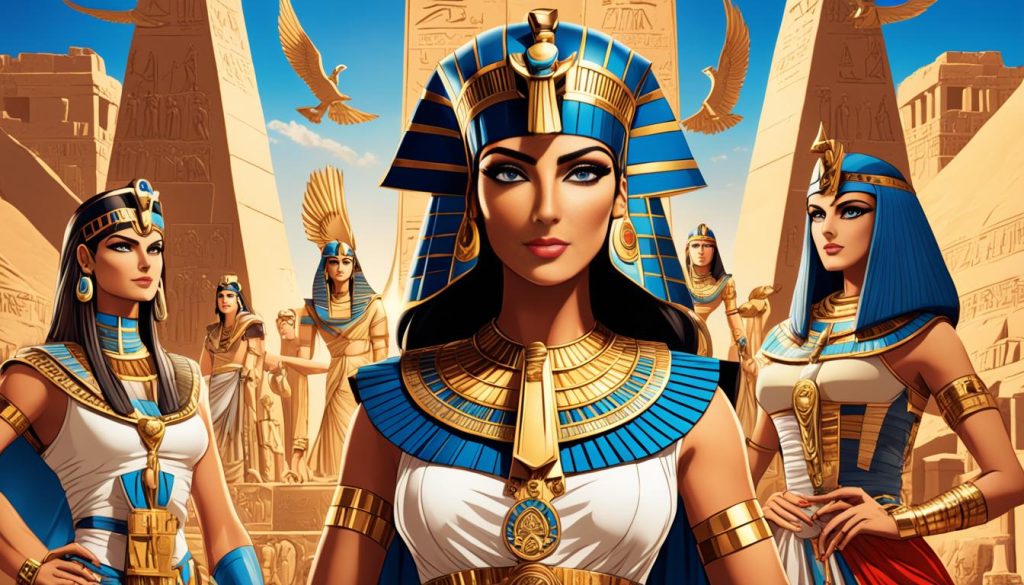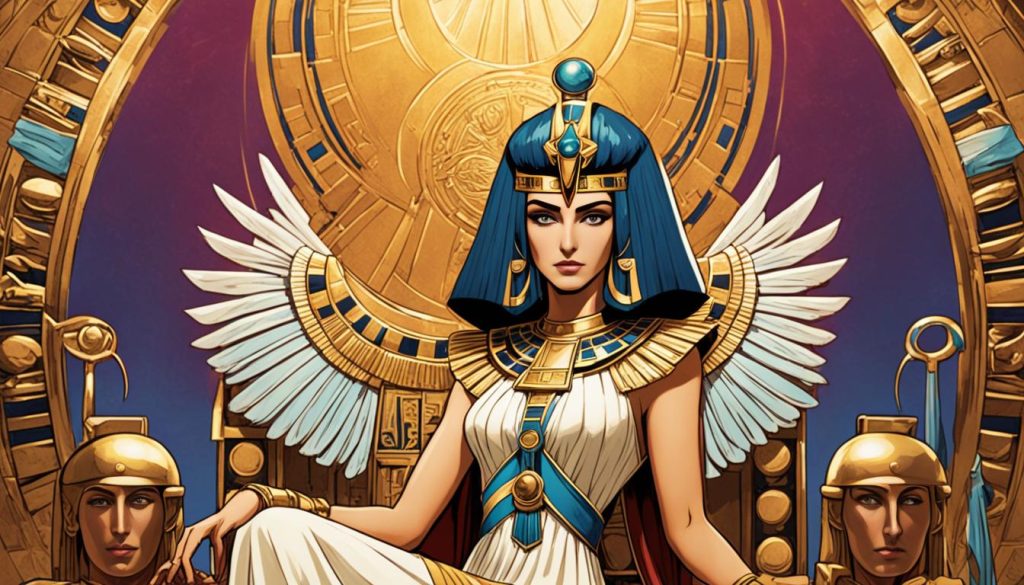When we think of ancient Egyptian rulers, one name that often comes to mind is Cleopatra VII. Known as the last sovereign of the Ptolemaic dynasty, Cleopatra ruled as the Queen of Egypt and left behind a legacy that continues to fascinate historians and captivate storytellers. But who was Cleopatra VII, and what makes her reign so remarkable?
Was Cleopatra simply a femme fatale entangled in dramatic affairs with Julius Caesar and Mark Antony? Or was she a shrewd political leader who wielded power and influence during a pivotal period in history? Let’s delve into the life and legacy of Cleopatra VII, the ancient Egyptian ruler whose story unfolds along the banks of the famous Nile River.
Key Takeaways:
- Cleopatra VII was the last sovereign of the Ptolemaic dynasty and ruled as the Queen of Egypt.
- She played a significant role in Roman politics and had influential relationships with Julius Caesar and Mark Antony.
- Cleopatra’s life and legacy continue to inspire books, plays, and movies, solidifying her place in popular culture.
- Her reign coincided with the flourishing of Alexandria as a center of intellectual and cultural activity.
- Cleopatra’s linguistic abilities and multicultural identity allowed her to connect with a diverse range of individuals.
Early Life and Ascension to the Throne
Cleopatra VII, the iconic Queen of Egypt, was born in 69 BCE as the daughter of Ptolemy XII, a descendant of Ptolemy I Soter. Upon her father’s death in 51 BCE, Cleopatra found herself in a momentous position, ascending the Egyptian throne alongside her younger brother, Ptolemy XIII.
However, the newfound power was soon overshadowed by conflicts within the royal family. Facing threats and political unrest, Cleopatra was compelled to flee her homeland, seeking refuge in the neighboring kingdom of Syria.
It was during this period of exile that Cleopatra’s path intertwined with Julius Caesar, the renowned Roman general. Recognizing her intelligence and determination, Caesar offered his support, enabling Cleopatra to regain her position as the ruler of Egypt and reclaim her rightful place in Alexandria.
With Julius Caesar’s backing, Cleopatra’s authority and influence grew substantially. She emerged as a key player in the political landscape, both in Egypt and beyond.
Cleopatra’s early life and ascension to the throne marked the beginning of a captivating saga that would forever etch her name in the annals of history.
Relationship with Julius Caesar
In her quest to maintain her position on the Egyptian throne and resolve her father’s debts, Cleopatra VII sought the support of Julius Caesar, a prominent figure in Roman politics.
As their relationship developed, Cleopatra and Julius Caesar spent a significant amount of time together in Alexandria.
“Their love affair and partnership had far-reaching implications, and Cleopatra’s influence on Julius Caesar sparked controversy and intrigue among both his supporters and opponents.”
During their time together, Cleopatra gave birth to a son named Caesarion, who was widely believed to be the child of Julius Caesar himself.
This love affair between Cleopatra VII and Julius Caesar not only captured the attention of the public but also had a profound impact on the political landscape of Rome.
With Cleopatra’s involvement in Roman politics and her romantic entanglement with Julius Caesar, their relationship became a subject of great fascination and speculation during their time.
Union with Mark Antony
After the assassination of Julius Caesar, Cleopatra formed a union with Mark Antony, a Roman general and one of the members of the second Triumvirate. Cleopatra and Antony developed a strong relationship and were known for their extravagant lifestyle. They formed a drinking society called “The Inimitable Livers” and had a son and twins together. Their relationship played a significant role in shaping the Roman Empire and led to the Battle of Philippi.
When Cleopatra aligned herself with Mark Antony, it sparked both fascination and controversy. Antony, already married to Octavia and previously married to Antony’s wife Fulvia, had a passionate love affair with Cleopatra that challenged the politics and traditions of the Roman Empire. Their union established a powerful alliance between Egypt and Rome, combining Cleopatra’s charm and wit with Antony’s military prowess.
“The Inimitable Livers” was not just a drinking society but a symbol of Cleopatra and Antony’s excesses. They indulged in extravagant parties and festivities, embracing a lifestyle of opulence and luxury. Their union fascinated and intrigued the Roman elite, who saw their relationship as a threat to the stability of the Empire.
However, it was not just their personal lives that attracted attention. Cleopatra and Antony’s relationship had significant political implications. Their alliance posed a threat to Octavian, another member of the second Triumvirate and a rival of Antony. The Battle of Philippi, fought in 42 BCE, pitted Antony and Octavian against Brutus and Cassius, the assassins of Julius Caesar. Cleopatra supported Antony by providing financial aid and naval support. Although Antony emerged victoriously, their triumph was short-lived as tensions between Octavian and Antony resurfaced.
Power Struggle with Octavian
The relationship between Cleopatra VII and Mark Antony drew scrutiny and criticism from Octavian, another member of the second Triumvirate. Octavian launched a propaganda war against Cleopatra, accusing her of influencing Antony and plotting to secure power in Rome. The “Donations of Alexandria,” a public celebration in which Cleopatra and Antony declared their children as rulers of various territories, further fueled the conflict. Octavian declared war against Cleopatra and Antony, leading to their ultimate downfall.
Octavian’s Propaganda War
Octavian, driven by his ambition to consolidate power in Rome, launched a relentless propaganda war against Cleopatra. He accused her of exploiting Antony for her personal gain and asserted that she had intentions to undermine the Roman Senate’s authority. These accusations aimed to tarnish Cleopatra’s reputation and portray her as a threat to Rome’s stability.
The “Donations of Alexandria”
The “Donations of Alexandria” ceremony marked a significant moment in Cleopatra and Antony’s attempt to solidify their power and influence. In this lavish event, held in 34 BCE, Cleopatra and Antony declared their children as rulers of various eastern provinces, including Egypt, Cyprus, and Syria. This public display of power incited anger and distrust among Roman elites, who feared the growing influence of the Egyptian queen and her impact on Rome’s political landscape.
Declaration of War
Octavian, motivated by his hatred for Cleopatra and his desire to eliminate Antony’s influence, used the “Donations of Alexandria” as an opportunity to rally support and declare war. He saw Cleopatra’s actions as a direct challenge to his authority and the Roman Senate’s sovereignty. Octavian, now known as Augustus, branded Antony and Cleopatra as enemies of Rome and led a relentless military campaign against them.
Despite Cleopatra and Antony’s valiant efforts to defend themselves, the power struggle with Octavian ended tragically, resulting in their defeat and demise.
Defeat and Death
The Battle of Actium in 31 BCE marked the downfall of Cleopatra VII and Mark Antony. Octavian’s forces defeated them, and Cleopatra’s ships fled to Egypt.
Antony believed Cleopatra had died and committed suicide.
Cleopatra, upon learning of Antony’s death, contemplated suicide but was placed under house arrest by Octavian’s men.
In a final act of defiance, Cleopatra ended her own life, possibly through the bite of an asp, on August 12, 30 BCE.
With her death, Egypt fell under Roman domination.
Cleopatra’s Legacy and Influence
Cleopatra VII, the last ruler of the Ptolemaic dynasty, continues to leave an enduring historical legacy and captivate the imagination of people worldwide. Known for her relationships with influential Roman leaders, Cleopatra is often portrayed as a romantic femme fatale, adding intrigue to her already fascinating story.
Cleopatra’s magnetic persona and captivating life have inspired numerous books, plays, and movies that perpetuate her legacy as a powerful and enigmatic figure in ancient history. Her story unfolds on the pages of novels, comes to life on stage, and graces the silver screen, ensuring that her influence remains alive and relevant in popular culture.

“Cleopatra is undoubtedly one of the most iconic figures in history. Her allure, intelligence, and romantic entanglements continue to capture the hearts and minds of people across generations. From Shakespeare’s plays to Hollywood blockbusters, Cleopatra’s story resonates with audiences worldwide.”
As a historical figure with a complex persona, Cleopatra’s legacy is multi-faceted. While her relationships with Julius Caesar and Mark Antony have contributed to her perception as a romantic femme fatale, it is important to recognize her political acumen and her influence as a ruler. Cleopatra skillfully navigated the treacherous world of Roman politics and secured her position as the Queen of Egypt amidst turbulent times.
Through her extraordinary life, Cleopatra has left an indelible mark on history and continues to be remembered as a symbol of power, beauty, and intelligence. Her legacy serves as a testament to the enduring fascination with the enigmatic rulers of ancient Egypt.
Cleopatra’s Royal Lineage and Ptolemaic Dynasty
Cleopatra VII, a prominent figure in ancient Egyptian history, belonged to the renowned Ptolemaic dynasty. This dynasty ruled over Egypt, following the death of Alexander the Great in 323 BCE, until its ultimate annexation by Rome in 30 BCE.
Although born into a Macedonian lineage, Cleopatra had limited Egyptian blood. However, she skillfully navigated the intersections of her Greek heritage and her political association with the Egyptian goddess Isis. In fact, Cleopatra even adopted the title of the “New Isis” as a strategic move to solidify her connection to the Egyptian culture.
Plutarch, the renowned ancient Greek biographer, described Cleopatra’s political alignment with Isis in his writings. This association allowed Cleopatra to present herself as a divine figure, weaving together her Macedonian and Egyptian roots for both political and cultural advantages.
Image:
Cleopatra’s Charismatic Leadership and Political Influence
Cleopatra VII, the last sovereign of the Ptolemaic dynasty, was known for her charismatic leadership and remarkable intelligence. These qualities were instrumental in furthering Egypt’s political aims and solidifying her position as a popular ruler among her subjects.
Unlike many other rulers of her time, Cleopatra possessed fluency in the Egyptian language, allowing her to communicate directly with her Egyptian subjects. This ability not only set her apart but also contributed to her favorable reputation as a capable leader who understood and connected with her people.
“Cleopatra’s magnetic personality and intelligence allowed her to navigate complex political landscapes with ease. She had an innate ability to charm and captivate those around her, making her a formidable force in ancient Egypt.”
Her influence extended beyond her captivating charisma. Cleopatra’s political acumen and strategic alliances played a crucial role in navigating the turbulent waters of Egyptian politics, particularly during her relationships with Julius Caesar and Mark Antony.
As described by historian Plutarch, Cleopatra’s captivating personality and intelligence were evident in her interactions and negotiations with powerful Roman leaders. Her influence and political maneuvering were key factors in securing Egypt’s stability and influence in the wider Mediterranean world.
“Cleopatra’s intelligence and charisma were weapons in her political arsenal. She was able to leverage her charm and intellect to protect and advance Egypt’s interests amidst powerful rivalries and shifting alliances.”
Throughout her reign, Cleopatra’s ability to unite her intelligence, charisma, and fluency in the Egyptian language made her an exceptional leader. Her impact was not only felt during her lifetime but continues to resonate in history due to her unique qualities and unwavering dedication to her kingdom.

Cleopatra’s Role in Egyptian Society and Culture
Cleopatra VII had a profound influence on Egyptian society and culture during her reign. Her commitment to the preservation and advancement of Egyptian culture is evident in her patronage of the arts and support for educational endeavors.
In Alexandria, the thriving center of intellectual and cultural activity during Cleopatra’s reign, she fostered an environment where artists, scholars, and philosophers flourished.
“The arts are the soul of a civilization, and I believe in nurturing and celebrating the creative spirit,” Cleopatra emphasized. “Through the support of artists, we can capture the essence of our culture and ensure its longevity.”
Cleopatra’s passion for education was reflected in her efforts to establish schools and libraries throughout Egypt. She believed that a well-educated populace was essential for the prosperity and stability of her kingdom.
Inspired by the great library of Alexandria, Cleopatra encouraged the collection and preservation of knowledge, ensuring that future generations would have access to a vast array of literature and scholarly works.
“Education is the cornerstone of a enlightened society,” Cleopatra proclaimed. “By investing in education, we empower our people to reach their full potential and contribute to the greatness of Egypt.”
Furthermore, Cleopatra’s patronage extended beyond the arts and education. She actively supported the construction and restoration of temples, emphasizing the significance of religion and spirituality in Egyptian society.
Through her unwavering dedication and support, Cleopatra left a lasting impact on Egyptian society and culture.
Her reign as the last sovereign of the Ptolemaic dynasty not only marked a significant period in ancient Egyptian history but also served as a testament to her commitment to the preservation and advancement of Egyptian culture.
Cleopatra’s Linguistic Abilities and Multicultural Identity
Cleopatra, the famed Egyptian ruler, possessed remarkable linguistic abilities that set her apart in the ancient world. In addition to her mastery of Greek and the Egyptian language, she was known to speak as many as a dozen other languages. This linguistic prowess allowed Cleopatra to connect with individuals from diverse cultures and solidify her position as a prominent figure in her time.
“Cleopatra was a marvel of linguistic talent, effortlessly conversing in multiple languages,” wrote renowned historian Plutarch.
As a descendant of the Ptolemaic dynasty, Cleopatra’s multicultural identity was a significant aspect of her persona. With ties to both Greek and Egyptian heritage, she embodied the blending of two prominent cultures. This unique background shaped Cleopatra’s approach to rulership and further strengthened her connection to her subjects.
In her role as the Queen of Egypt, Cleopatra leveraged her linguistic abilities to communicate directly with her Egyptian subjects. This fluency in the native language not only endeared her to the people but also showcased her commitment to understanding and embracing the Egyptian culture.
In a society characterized by diverse influences and cultural integration, Cleopatra’s linguistic diversity and multicultural identity allowed her to navigate political and social spheres with ease. Her ability to bridge the gap between Greek and Egyptian cultures cemented her position as a celebrated leader of her time.
Egyptologist Dr. Sarah Parcak emphasized, “Cleopatra’s command over multiple languages enabled her to navigate the complexities of her empire, contributing to her influence and success.”
Conclusion
Cleopatra VII’s life and reign marked a significant period in ancient Egyptian history. As the last ruler of the Ptolemaic dynasty, Cleopatra navigated complex political landscapes and left a lasting legacy. Her cultural impact, linguistic abilities, and influence on Egyptian society continue to captivate historians and enthusiasts alike. Cleopatra’s story intertwines with the Nile River and the rich history of ancient Egypt, ensuring her place as a prominent figure in the annals of civilization.
Throughout her reign, Cleopatra’s historical significance was evident in her political alliances, strategic maneuvers, and cultural contributions. She sought to maintain Egypt’s independence and protect its interests amidst the power struggle of the Roman Empire. Cleopatra’s intelligence, charisma, and fluency in multiple languages allowed her to navigate various diplomatic endeavors and influence those around her.
Cleopatra’s historical legacy is further enhanced by her close association with the Nile River. As the longest river in the world, the Nile played a crucial role in shaping ancient Egyptian civilization. Cleopatra’s reign coincided with a time of great prosperity and cultural progress along the Nile, with Alexandria at the forefront of intellectual and artistic achievements. Her patronage of the arts and support for educational endeavors contributed to the flourishing of Egyptian society.
























